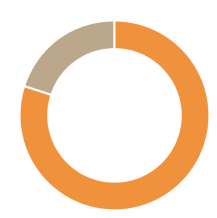NHS mental health absences last three times longer than COVID absences
Working time lost to poor mental health cost the NHS £371.2m over the last twelve months.
NB: this article was written before FirstCare rebranded to GoodShape on 30.10.21
FirstCare data indicates that the duration of mental health-related absences was, on average, more than treble that of COVID-related absences between 1st June 2020 and 1st June 2021. The accumulative figure puts lost days to mental health-related absences at 2.5 million working days, compared to 2.1 million working days for COVID-related absences. The loss in productivity over the last twelve months will have cost the NHS more than £371.2m.*
The average duration of days out-of-work for mental health-related absences equates to 18.59 days, compared to the average duration of a COVID-related absence of 5.9 days**. The number of NHS staff affected by mental ill health is rising, with a 25.2% increase from February-May 2021, (in February 2021, FirstCare estimates that 10,600 NHS workers were affected, rising to 13,300 in May 2021).
FirstCare data was used in the Workforce burnout and resilience in the NHS and social care report from the House of Commons' Health and Social Care Committee published on 8th June 2021, and our data has also been cited in Dean Russell MP's First Aid (Mental Health) Parliamentary Bill proposal.
Our NHS: Wellbeing & Mental Health Alert revealed
In the last 12 months (June 2020 - June 2021):
- More than 2.5 million working days have been lost in the NHS to mental health-related absence versus 2.1 million working days lost to COVID-related absence
- Mental health-related absences cost the NHS £371.2m
- COVID-related absences cost the NHS £310.7m
- The average duration of an absence related to mental health is more than treble that of an average COVID-related absence:
- The average duration of a COVID-related absence was 5.9 days
- The average duration of a mental health-related absence was 18.59 days
- FirstCare insights indicate 10.6%*** of all NHS workers have been affected by mental health-related absence (136,306 NHS workers). Of mental health-related absences:
- 80.2% (109,315) absences are for female NHS staff
- 19.5% (26,548) are for male NHS staff
- When weighted to the gender split of the NHS workforce (approximately 75% female / 25% male), the split in terms of mental health-related absence is 57% female / 43% male.
- FirstCare insights indicate 27.5% of NHS workers have been affected by COVID-related absences (354,522 of all NHS workers)
- The numbers of NHS staff affected by mental ill health is rising, showing a 25.2% increase from February-May 2021, (in February, FirstCare estimates that 10,600 NHS workers were affected, rising to 13,300 in May 2021).
Ian Caminsky, Chief Executive Officer at FirstCare comments:
“It’s important we take care of the most precious commodity in the NHS, the health of frontline workers. To do this, we need to take a proactive and preventative stance. Unfortunately, leaders are often looking at their team’s mental wellbeing through a rear-view mirror. This lack of real-time insight into the wellbeing of frontline workers, means early evidence-based interventions to address wellbeing in the workforce cannot be taken.
Suzanne Marshall, Clinical Governance Officer at FirstCare comments:
“Our data shows 60% of staff leave their job after two mental health-related absences, making early recognition of the symptoms and an open conversation critical to helping avoid the development of more serious illness and increased time off.”
Methodology
The figures are based on analysis of FirstCare data. We work with a range of large employers across the UK including public service providers, such as councils, police, and NHS Trusts. The NHS Trusts we support have a combined workforce of more than 46,000 people. FirstCare has extrapolated its figures to the UK NHS workforce of 1,289,793 people (March 2020 figures, published by NHS Digital on 25th June 2020) to provide the estimated figures included in this announcement. GoodShape’s data differs from that of sources such as Public Health England because it is derived from the ongoing, daily analyses of workplace wellbeing, rather than ad hoc research or retrospective studies.
*All included NHS cost figures are based on the NHS average salary of £33,547, and a 228-day working year, without the cost of admin and replacement staff.
**COVID-related absences include not only confirmed cases but examples such as:
- Absences following COVID vaccinations (normally only 1 day)
- Care of a dependent (e.g. childcare due to school closure)
- ‘Suspected’ cases, where self-isolation may be shortened, subject to test.
For these reasons, and the shortened self-isolation period since December, the average duration of COVID-related absences here is shorter than the government guidance for self-isolation.
***Calculation of NHS workers affected by mental health-related absence based on the NHS total workforce = 1,289,793
“Unfortunately, leaders are often looking at their team’s mental wellbeing through a rear-view mirror.”

Lorem ipsum dolor
sit amet, consectetuer
adipiscing.

Lorem ipsum dolor
sit amet, consectetuer
adipiscing.
Find out how we can help.
Fill out the form below and one of our team will be in touch to arrange a meeting.



